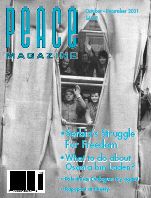
Peace Magazine Oct-Dec 2001, page 4. Some rights reserved.
Search for other articles by PMag staff here
On September 11, 2001, terrorists stuck the centre of global capitalism and the headquarters of the world's largest military organization. As we go to press, the general opinion is that Osama bin Laden's network is responsible, and that the United States and many other countries will jointly wage some kind of war against bin Laden and other terrorists. It is important that we analyze the situation accurately, though far too few facts can be ascertained. We do offer a clear background piece on bin Laden by John Bacher, who proposes a response based on curtailing his source of funding. We also present a piece by Zeina Awad on the difficulties involved in holding dialogues between Palestinians and Israeli supporters in North America. Much of the energy behind bin Laden comes from the bad relations between the West and Islam. Any real peace requires that justice be done to the Palestinians and to the inhabitants of Iraq, among other Muslims groups. And this process must begin with a renewed dialogue.
But much more is also required. Instead of pursuing a do-it-yourself quest to punish the perpetrators, we should take this opportunity to affirm the principles of international law by using the nascent organization devoted to that cause, the International Criminal Court. Were that court in force already, its authority would be the first one invoked in this situation. However, it does not exist and, oddly, has been impeded by the United States, above all other states. While accepting the establishment of ad hoc tribunals such as the Yugoslav and Rwanda tribunals, the United States has been reluctant to sign onto any agreement that might make it subject to punishment for crimes against humanity, on the same footing as all other states. Moreover, as Lloyd Axworthy has pointed out, the terms of the Rome Treaty would have to be expanded to include plane hijacking and all other terrorist acts. That change should be undertaken immediately, under Canada's leadership. In the meantime, another ad hoc tribunal can be created to handle the current investigation and prosecution, thus situating the problem under the rule of law.
We recently introduced you to Colonel Petrov, the Soviet officer who refused to launch missiles against US targets during the Cold War on receipt of a false alarm about incoming American missiles. Colonel Petrov, now retired, lives on a pension of about $50 per month, so we proposed to raise money as a small gift to him. Generous readers sent cheques, and we have sent $500 Canadian to him via a trusted friend, a journalist who will herself publicize his heroism for the first time in a Russian newspaper. We will tell you more later about their visit.

Peace Magazine Oct-Dec 2001, page 4. Some rights reserved.
Search for other articles by PMag staff here